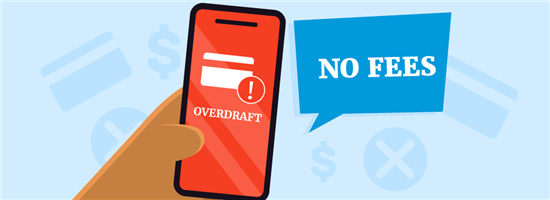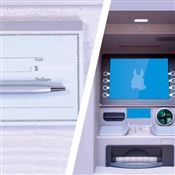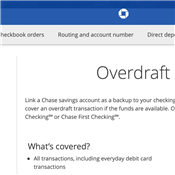Banks with No Overdraft Fees
Ad Disclosure: This article contains references to products from our partners. We may receive compensation if you apply or shop through links in our content. This compensation may impact how and where products appear on this site. You help support CreditDonkey by using our links.
Banks are slowly starting to ditch overdraft fees. If you're looking to open a new account without overdraft fees, here are some of the top picks.
 |
Here are the best banks with no overdraft fees:
Rewards Checking - Up to 3.30% APY
- Build your own APY with up to 3.30% APY*
- Zero monthly maintenance fees
- Zero overdraft or NSF fees
- Zero minimum monthly balance reqs
- No initial deposit requirement
- Unlimited domestic ATM fee reimbursements
- Online debit card management
- Simple, 3-step process for direct deposit
Overdraft fees can pile up and eat into your savings, making them quite frustrating. This is especially true for those who are trying to get by on a lower income.
To help you avoid these overdraft fees, here's a list of banks that don't have them at all.
Best Banks With No Overdraft Fees
Overdraft fees can be heavy on your bank account, so do yourself a favor and ditch them. Here are some of the top picks for banks that don't charge any overdraft fees.
Overdraft fees are charges that occur when you make a purchase and don't have enough money in your account to cover it. In some cases, the bank will lend you money to clear the purchase but will charge you an overdraft fee on top of that.
Ally Bank
If you're looking for an account that doesn't charge any overdraft fees, Ally Bank is a great place to start.
With their Spending account, if you don't have enough funds to cover a purchase, Ally has the choice of paying the rest or denying the transaction completely. Either way, you won't be charged any overdraft fees.
Additionally, Ally has an overdraft service called CoverDraft which will provide up to $250 in relief for common transactions.[1]
To qualify for CoverDraft, you'll first need to deposit $100 or more into your Spending account. Your basic coverage will start at $100, but setting up direct deposit and receiving at least $250 for two months in a row will get it up to $250.[2]
Why we like Ally Bank:
Aside from overdraft fees, Ally also does not charge for the following:[2]
- Monthly maintenance fees
- Standard or expedited ACH transfers
- Incoming wires (domestic and international)
- Official and cashier's checks
They offer competitive APYs on both their Spending and Savings accounts as well. Of course, if you want the higher APY, go with the Savings account.
Online Savings Account - 3.50% APY
$0 minimum opening deposit. No minimum balance requirement. No fees to open or maintain account.
Personal Savings Account - $100 Referral Bonus
You must enroll in the offer via your friend's personal link. Open a new Ally Bank Savings Account within 30 days of enrollment. Set up and receive one or more monthly automated recurring transfer/s within 30 days of account opening. The monthly automated recurring transfer/s must continue for at least three consecutive months. The $100 bonus will be deposited to your account within 30 days of receiving your third monthly recurring transfer.
Both these accounts have a unique feature called buckets. For the Spending account, you have spending buckets that let you set money aside for scheduled expenses like rent and groceries.
For the Savings account, you'll have savings buckets that you can use to stash your cash and track your savings progress—all while earning interest.
Pros+Cons
|
|
Axos Bank
Axos Bank's Essential and Rewards Checking accounts don't charge any fees for overdrafts or non-sufficient funds. This means you won't get penalized for accidentally overspending.
Essential Checking
- Unlimited domestic ATM reimbursements
- No monthly maintenance fees
- No annual fee
- No overdraft or non-sufficient funds fee
Rewards Checking - Up to 3.30% APY
- Build your own APY with up to 3.30% APY*
- Zero monthly maintenance fees
- Zero overdraft or NSF fees
- Zero minimum monthly balance reqs
- No initial deposit requirement
- Unlimited domestic ATM fee reimbursements
- Online debit card management
- Simple, 3-step process for direct deposit
Why we like Axos Bank:
Axos provides two great account options for your needs. For a basic checking approach, go with the Essential Checking account. If you're looking for opportunities to earn interest, the Rewards Checking account provides a really competitive APY.
Both these accounts have $0 monthly maintenance fees and no minimum monthly balance requirements. On top of that, they also include unlimited domestic ATM fee reimbursements.[3]
Pros + Cons:
|
|
Let's say you have $100 in your account. Unfortunately, your car breaks down and the repairs are worth $150. Since you're short $50, the bank lends it to you so the purchase clears. If that bank had a $30 overdraft fee, you'd have to pay back the $50 with an additional $30. In the end, you would have a negative balance of $80.
Capital One
Capital One has a 360 Checking Account with no overdraft fees.
With this checking account, you have multiple overdraft options:[4]
- Auto-Decline: This allows you to automatically decline transactions that'll cause overdrafts.
- Free Transfer: With this option, you can transfer funds automatically from a savings or money market account (for free).
- No-Fee Overdraft: If your funds can't cover a purchase, Capital One has the choice of declining or approving it. Approved transactions that put your balance below $0 won't come with any fees.
Personal Checking Account - $300 Bonus
Open a new 360 Checking account. Use promo code OFFER300 at account opening. Set up and receive 2 qualifying direct deposits of $500 or more within 75 days of account opening.
Why we like Capital One:
On top of no overdraft fees, the Capital One 360 Checking account also has a decent APY. This means you save money by avoiding fees while earning extra through interest.
There are also no service fees, no minimum balance requirements, and no foreign transaction fees.
Pros + Cons:
|
|
Citibank
As of 2022, Citibank has eliminated overdraft fees—which is rare for traditional banks. If you want no overdraft charges, you can check out their Basic Banking Package checking account.[5]
They have an overdraft protection feature called the Safety Check which will withdraw money from your savings or money market account and transfer it into your checking account in case you overspend.[6]
Why we like Citibank:
While many Citi accounts have monthly fees, you can often have them waived depending on the account you choose.
Citi offers two types of accounts: Everyday and Premium. Everyday accounts are basic accounts for most people, while Premium accounts appeal to a more specific clientele. This gives you options to choose from.
Pros + Cons:
|
|
Not all banks have overdraft fees. Some banks completely remove overdraft fees, while others provide overdraft protection, giving you extra time to fix a negative balance in your checking account.
CHIME
Although Chime technically isn't a bank, they offer basic mobile banking services that make managing your money easy and free. Their online checking account comes with no monthly fees, no minimum balance requirement, and no overdraft fees.
They also have an overdraft protection program called SpotMe. With this, Chime will cover up to $200 on your debit card purchases and cash withdrawals with no overdraft fees.[7]
To enroll in SpotMe, you'll need to receive $200 or more in qualifying direct deposits within 34 days and activate your Chime debit card. From there, you can open your app, head to the Settings tab, and opt-in for SpotMe.
Free Mobile Checking
Chime is a financial technology company, not a bank. Banking services provided by, and debit card issued by, The Bancorp Bank or Stride Bank, N.A.; Members FDIC.
Why we like Chime:
The Chime mobile app is an award-winning platform with a 4.8 rating on both the App Store and Google Play Store. Thus, it is a great place to start if you plan on going the mobile banking route.
Creating an account is also incredibly quick and easy. You just need to provide your name, date of birth, address, and Social Security number and you'll be done in two minutes. From there, just download the app and you're ready to get started.
Pros + Cons:
|
|
SoFi
SoFi's Checking and Savings account is not only one of the best rewards checking accounts out there, but it also offers a fee-free overdraft coverage program.
With this account, you'll be covered up to $50 with no fees on your debit card purchases. However, to be able to get this coverage, you'll need to have monthly direct deposits of $1,000 or more.[8]
Sofi Checking and Savings
- Up to 3.80% APY with direct deposit on savings balances
- $0 monthly fees
- No minimum balance
- Get paid 2 days early
Why we like SoFi:
The SoFi's Checking and Savings account offers up to a 15% cashback at participating local establishments when you pay with your SoFi debit card.
And since this account also functions as a savings account, it has a really competitive APY on your savings balance.
If you don't have an account yet, SoFi will often offer cash bonuses for signing up and setting up direct deposit. Be sure to check out the offer they have now and see if you qualify for a cash bonus.
Pros + Cons:
|
|
Alliant Credit Union
Alliant Credit Union's High-Rate Checking account offers no overdraft fees, no monthly fees, and no account minimums.
They also have a free overdraft protection service. So if you ever find yourself with insufficient funds to clear a transaction, funds can automatically be transferred from your Alliant Savings or Supplemental Savings to cover the overdraft.[9]
High-Rate Checking
- 0.25% APY when you opt in to eStatements and have at least one monthly electronic deposit to your account
- No monthly service fee
- No minimum balance requirement
- Up to $20/month in ATM fee rebates
Why we like Alliant Credit Union:
Alliant's High-Rate Checking Account also offers a better-than-average rate, allowing you to earn interest on your money.
Additionally, you also get $20/month in ATM fee rebates, letting you avoid more fees in the process.
Pros + Cons:
|
|
How Overdraft Services Work
Each overdraft service will differ per bank. Here are the most common ones:
- Decline transaction
To completely avoid any overdraft, banks may just deny transactions that will put your balance on the negative. - Overdraft protection transfer
Instead of paying to complete the transaction themselves, the banks may grab funds from your linked accounts and transfer them automatically into your checking account. - Overdraft coverage
To help you clear the transaction, the banks may pay for the remaining funds needed. Your account will still reflect a negative balance and the bank will often give you a specific amount of time to bring it out of negative status. - Overdraft line of credit
Just like overdraft coverage, the bank will lend you money to cover the transaction. However, what they'll charge you is interest on the loan at a rate similar to credit cards (and potentially a transfer fee). Just be sure to pay the loan back as soon as possible.
How To Choose A Bank With No Overdraft Fees
Before you dive wallet-first into a new bank account, here are a few things that you should keep in mind:
- Overdraft options
Banks deal with overdrafts differently. Before creating an account, find out what kind of protection services they offer and how much time you have to clear your negative balance. - Fees and minimums
Sure, there aren't any overdraft fees, but are there monthly service fees or minimum balance requirements? It's important that you look beyond overdraft fees so that you get the full picture of the charges you'll encounter. - Other features
A bank that doesn't charge overdraft fees is a great thing. However, it isn't the be-all and end-all. You also need to check what features they offer that suit the type of banking you need.
Why Are Banks Eliminating Overdraft Fees
More and more banks are beginning to eliminate overdraft fees—but why?
The banking landscape is changing. Banks are getting more and more competitive, and they've caught on to the fact that customers don't like paying fees.
Smaller banks and mobile banking fintech companies are also sprouting up and challenging traditional banks. To stay competitive, banks are eliminating overdraft fees.
They're also noticing that getting rid of overdraft fees opens up the door for more financial inclusivity. People, especially those with lower incomes, will have an easier time establishing and maintaining financial security.
Methodology
To come up with a list of banks, we looked at several banks that didn't charge any overdraft fees. Then we checked which of them offered the best overdraft protection services.
On top of that, we looked at additional features that came with the accounts of each bank. This is so that we had a list of banks that not only featured fee-free overdraft protection services but also features that provide helpful benefits in everyday banking.
What the Experts Say
CreditDonkey asked a panel of industry experts to answer readers' most pressing questions. Here's what they said:
Bottom Line
Overdraft fees are a pain. Luckily, there are a couple of banking options you could go with to avoid them completely.
Rewards Checking - Up to 3.30% APY
- Build your own APY with up to 3.30% APY*
- Zero monthly maintenance fees
- Zero overdraft or NSF fees
- Zero minimum monthly balance reqs
- No initial deposit requirement
- Unlimited domestic ATM fee reimbursements
- Online debit card management
- Simple, 3-step process for direct deposit
You could opt for a more traditional bank like Citibank, or you could go with modern one like Chime. Either way, you can save a lot of money with their overdraft services.
Ultimately, when choosing a bank, consider both the overdraft fees and how you want them to handle your money.
References
- ^ Ally. Introducing CoverDraft — take the stress out of accidental overspending, Retrieved 10/16/2023
- ^ Ally. Straight Talk Product Guide: Ally Bank Spending Account, Retrieved 11/21/2023
- ^ Axos Bank. Compare Checking Accounts, Retrieved 10/16/2023
- ^ Capital One. Overdraft Options, Retrieved 10/5/2023
- ^ Citi. Basic Banking Package, Retrieved 10/16/2023
- ^ Citi. Safety Check, Retrieved 10/5/2023
- ^ Chime. Overdraft worries? Not with SpotMe, Retrieved 10/16/2023
- ^ SoFi. We've got your back with no-fee Overdraft Coverage, Retrieved 10/16/2023
- ^ Alliant. High-yield checking account with no overdraft fees, Retrieved 10/16/2023
Write to Iggi Vargas at feedback@creditdonkey.com. Follow us on Twitter and Facebook for our latest posts.
Note: This website is made possible through financial relationships with some of the products and services mentioned on this site. We may receive compensation if you shop through links in our content. You do not have to use our links, but you help support CreditDonkey if you do.
|
|
|





